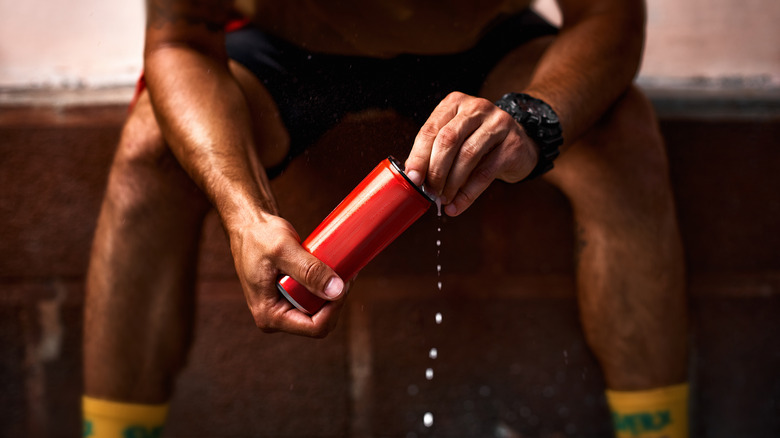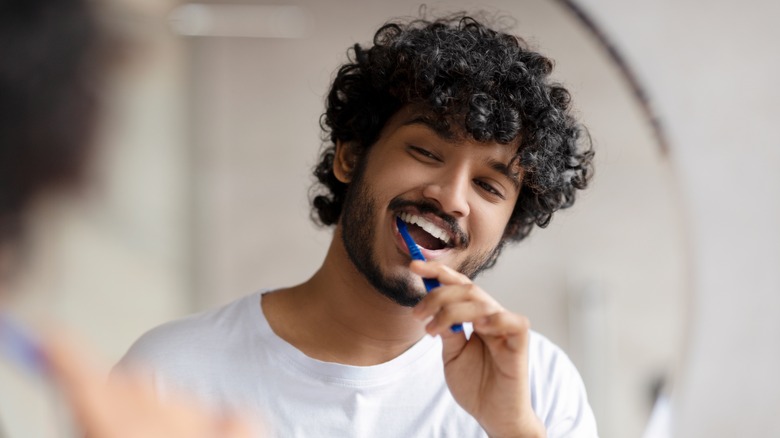Here's How Energy Drinks Can Ruin Your Gum And Teeth Health
We all know that sugary foods and beverages can harm our teeth, which is why many of us are careful about drinking soda and fruit juices too often. However, there's one type of drink that you might not realize is harming your teeth just as much as soda: energy drinks. Research has shown that energy drinks can be extremely damaging to your oral health. A study published in the journal General Dentistry found that people who consume energy drinks regularly are more likely to have gum disease and tooth decay than those who regularly drink sports drinks. So what makes energy drinks so bad for your teeth? It all comes down to the high levels of sugar and acidity in these drinks (via Healthline). Both of these ingredients can contribute to tooth decay and gum disease.
If you're going to consume energy drinks, it's important to take some steps to protect your teeth. Make sure to drink plenty of water after you have an energy drink, which will help rinse away the sugar and acidity from your teeth. You should also try to limit how often you drink energy drinks, as any time you drink one is exposing your teeth to sugar and high acidity levels. Energy drinks may give you a boost of energy, but they also pose a high risk to your oral health. Be sure to take care of your teeth if you do choose to consume these drinks.
Other foods and drinks that can damage your teeth
Energy drinks aren't the only beverage that can cause damage to your mouth when consumed regularly. There are actually many drinks that can cause harm to your teeth and gums when you drink them too often. One of the worst offenders is soda, which tends to contain a high amount of sugar (via Healthline). Many types of soda are also highly acidic and can hurt your teeth that way as well. Although fruit juice contains more vitamins and minerals than soda, juice is also very acidic and can cause damage to your teeth when consumed in excess. It's best to eat whole fruits, which provide more health benefits and don't expose your teeth to as much acid.
Coffee, while not very acidic, isn't great for your teeth because it can cause staining (via Daas Dentistry). Wine can also cause the same issue. If you do drink coffee or wine, be sure to brush your teeth afterward. Water is the best beverage for your teeth because it doesn't contain any sugar or acid. It also helps rinse away food and bacteria that can cause cavities. So, be sure to drink plenty of water throughout the day, especially after meals. And if you do drink sugary or acidic beverages, be sure to brush your teeth afterward to protect your smile.
How to practice good oral hygiene
We are taught to practice good oral hygiene from a young age, and many of us believe we know everything about it. But with more than a quarter of adults in the United States suffering from untreated tooth decay, there are clearly many people who don't take care of their mouths as much as they should (via CDC).
While brushing and flossing twice a day is the foundation of good oral hygiene, there are other things you can do to make sure your mouth stays healthy. The type of toothbrush you use is not as important as how often you use it, but choosing a brush that is comfortable for you will make brushing more enjoyable and likely to become a part of your daily routine (via WebMD). There are many different types of toothbrushes on the market, so try out a few until you find one that feels good in your hand and gets your teeth clean without causing any discomfort.
Flossing is just as important as brushing, yet many people skip this step in their oral hygiene routine. Flossing removes plaque and food particles from areas that your toothbrush cannot reach, so it's an essential to keep your mouth healthy (via Healthline). Even if you brush and floss religiously, it's important to visit the dentist regularly for professional cleanings and checkups. Your dentist can spot problems that you may not be aware of and can provide treatments to keep your mouth healthy.



